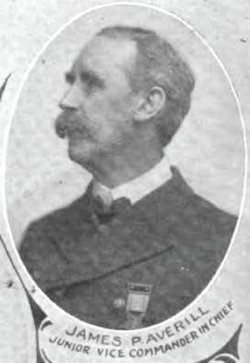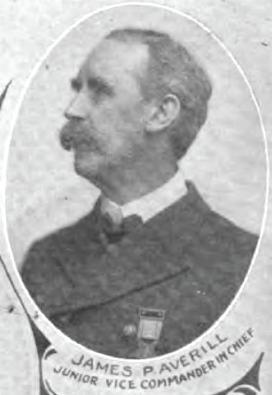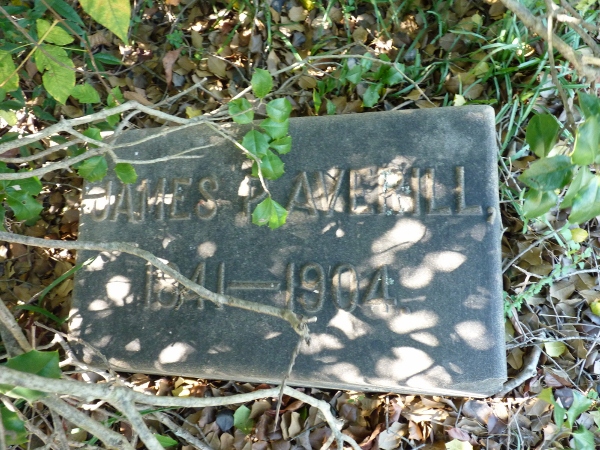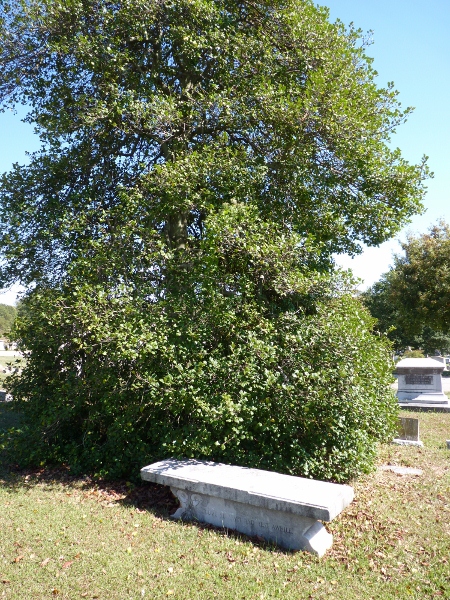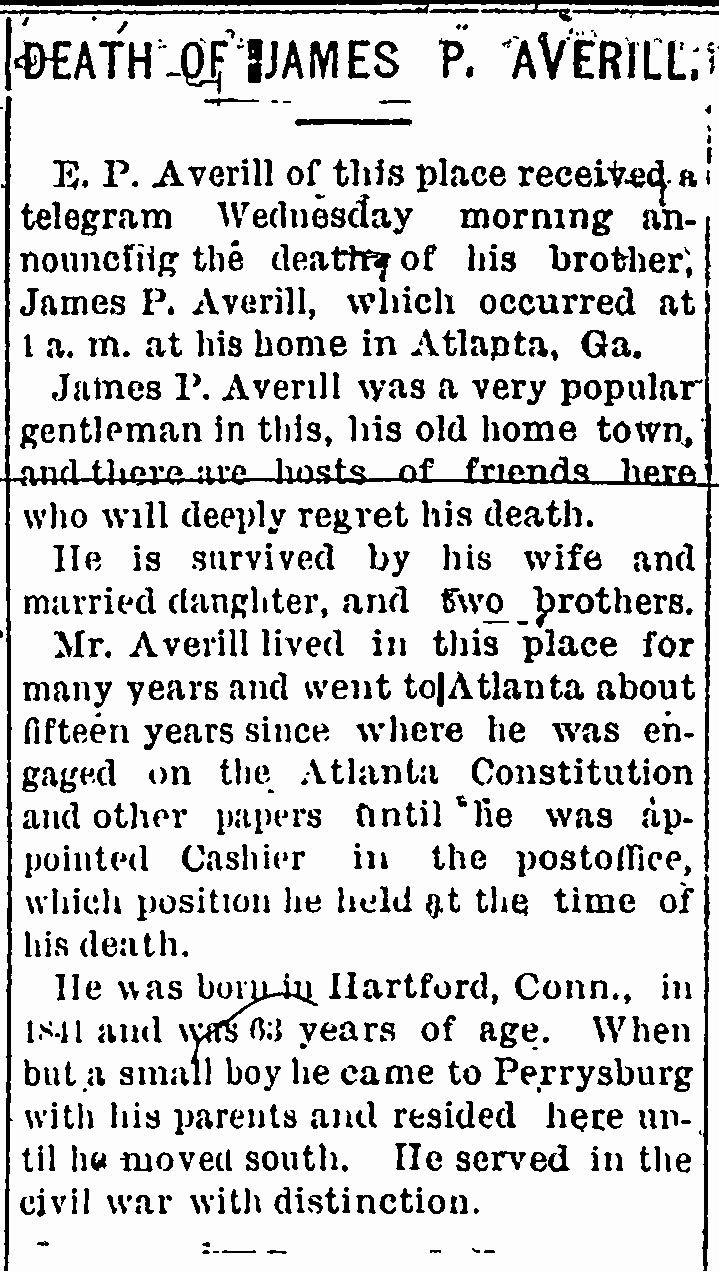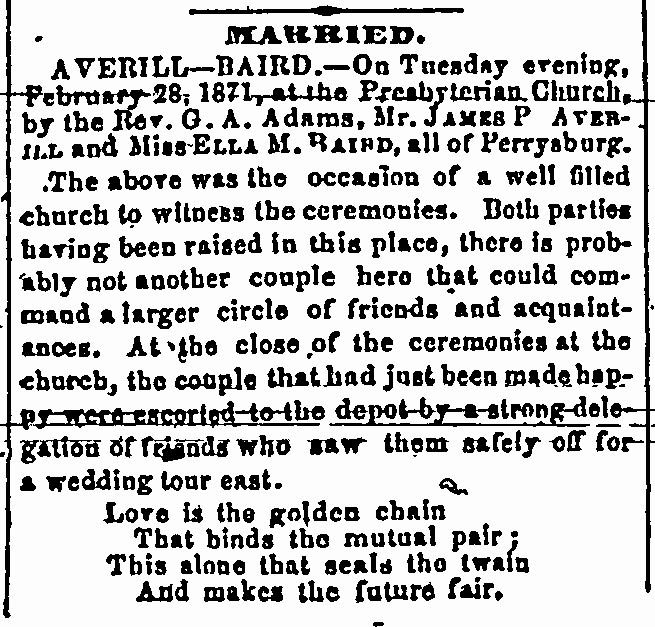At the age of 19 he enlisted for three months service on April 25th, 1861, and was mustered into service as a Sergeant in Company C of the 21st Ohio Volunteer Infantry Regiment at Camp Taylor, Ohio, on the 27th of that month. He served with the regiment in its movement to Gallipolis, Ohio, in May, remaining as part of the garrison of that town until July when the regiment was assigned to Brigadier General Jacob Cox's Kanawha Brigade of the forces gathering under Major General George B. McClellan, as part of this command the regiment took part in the reconnaissance up the Kanwaha River on July 7th, and was engaged in the action at Scarey Creek from July 14th to 17th, 1861. With the end of its three months service coming to a close the regiment returned to Columbus, Ohio, and were mustered out of service there on August 12th, 1861.
On May 2nd, 1864, he re-enlisted at the age of 22 for one hundred days service, and was mustered in as the First Sergeant of Company F of the 144th Ohio Volunteer Infantry
Regiment, on May 11th at Camp Chase, Ohio. The regiment was then moved to Baltimore, Maryland, and divided up to different posts, Companies A, C, D, F, & H, being assigned to the post of Fort McHenry. They remained on duty there until July when they were relieved and assigned to the 1st Separate Brigade of the 8th Army Corps, part of an effort to halt Confederate General Jubal Early's advance against Washington. With this force the regiment took part in the Battle of Monocacy, Maryland, on July 9th, and then moved back to Washington, D.C., to defend the town. After the Confederate forces began to withdraw the regiment went forward as part of the advance to Winchester, Virginia, from July 14th to 20th, being attached to the Kenley's Independent Brigade of the 8th Army Corps at that time. From July to August the regiment took part in the operations in the Shenandoah Valley, including the repulse of an attack by Colonel John S. Mosby's Rangers at
Berryville, Virginia, on August 13th, after which they remained at Berryville on guard duty until the 20th of August when they were ordered to return to Camp Chase, Ohio. On August 24th, 1864, Sergeant Averill was mustered out of service with his company at Camp Chase, ending his service in the Union Army.
Following the war he remained in Perrysburg, Ohio, where in 1886 he wrote and published "Fort Meigs. A condensed history of the most important military point in the Northwest, together with scenes and incidents connected with the sieges of 1813, and a minute description of the old Fort and its surroundings, as they now appear."
When the Wolford Post No. 51 of Perrysburg, Ohio, was organized as a part of the Department of Ohio, Grand Army of the Republic, he was one of the first to join and served as both the Post Adjutant (1882) and Commander until 1889, when he left Ohio and moved to Atlanta, Georgia. On March 25th, 1889, he was admitted to membership in the Ormsby M. Mitchel Post No. 1 of the Department of Georgia (including South Carolina), remaining a member of the post until his death. He served as the Post Commander and was appointed as the Department Assistant Adjutant General in 1895, and served (with the exception of 1897 and 1901) as such until 1904, in 1897 he was elected as the Department Commander, to the National Council of Administration in 1899, and in 1902 he was elected as the National Junior Vice Commander-in-Chief of the Grand Army of the Republic.
Comrade James P. Averill died on October 12th, 1904, and was interred at the Westview Cemetery in Atlanta, Fulton County, Georgia.
At the age of 19 he enlisted for three months service on April 25th, 1861, and was mustered into service as a Sergeant in Company C of the 21st Ohio Volunteer Infantry Regiment at Camp Taylor, Ohio, on the 27th of that month. He served with the regiment in its movement to Gallipolis, Ohio, in May, remaining as part of the garrison of that town until July when the regiment was assigned to Brigadier General Jacob Cox's Kanawha Brigade of the forces gathering under Major General George B. McClellan, as part of this command the regiment took part in the reconnaissance up the Kanwaha River on July 7th, and was engaged in the action at Scarey Creek from July 14th to 17th, 1861. With the end of its three months service coming to a close the regiment returned to Columbus, Ohio, and were mustered out of service there on August 12th, 1861.
On May 2nd, 1864, he re-enlisted at the age of 22 for one hundred days service, and was mustered in as the First Sergeant of Company F of the 144th Ohio Volunteer Infantry
Regiment, on May 11th at Camp Chase, Ohio. The regiment was then moved to Baltimore, Maryland, and divided up to different posts, Companies A, C, D, F, & H, being assigned to the post of Fort McHenry. They remained on duty there until July when they were relieved and assigned to the 1st Separate Brigade of the 8th Army Corps, part of an effort to halt Confederate General Jubal Early's advance against Washington. With this force the regiment took part in the Battle of Monocacy, Maryland, on July 9th, and then moved back to Washington, D.C., to defend the town. After the Confederate forces began to withdraw the regiment went forward as part of the advance to Winchester, Virginia, from July 14th to 20th, being attached to the Kenley's Independent Brigade of the 8th Army Corps at that time. From July to August the regiment took part in the operations in the Shenandoah Valley, including the repulse of an attack by Colonel John S. Mosby's Rangers at
Berryville, Virginia, on August 13th, after which they remained at Berryville on guard duty until the 20th of August when they were ordered to return to Camp Chase, Ohio. On August 24th, 1864, Sergeant Averill was mustered out of service with his company at Camp Chase, ending his service in the Union Army.
Following the war he remained in Perrysburg, Ohio, where in 1886 he wrote and published "Fort Meigs. A condensed history of the most important military point in the Northwest, together with scenes and incidents connected with the sieges of 1813, and a minute description of the old Fort and its surroundings, as they now appear."
When the Wolford Post No. 51 of Perrysburg, Ohio, was organized as a part of the Department of Ohio, Grand Army of the Republic, he was one of the first to join and served as both the Post Adjutant (1882) and Commander until 1889, when he left Ohio and moved to Atlanta, Georgia. On March 25th, 1889, he was admitted to membership in the Ormsby M. Mitchel Post No. 1 of the Department of Georgia (including South Carolina), remaining a member of the post until his death. He served as the Post Commander and was appointed as the Department Assistant Adjutant General in 1895, and served (with the exception of 1897 and 1901) as such until 1904, in 1897 he was elected as the Department Commander, to the National Council of Administration in 1899, and in 1902 he was elected as the National Junior Vice Commander-in-Chief of the Grand Army of the Republic.
Comrade James P. Averill died on October 12th, 1904, and was interred at the Westview Cemetery in Atlanta, Fulton County, Georgia.
Family Members
Sponsored by Ancestry
Advertisement
Records on Ancestry
Advertisement
